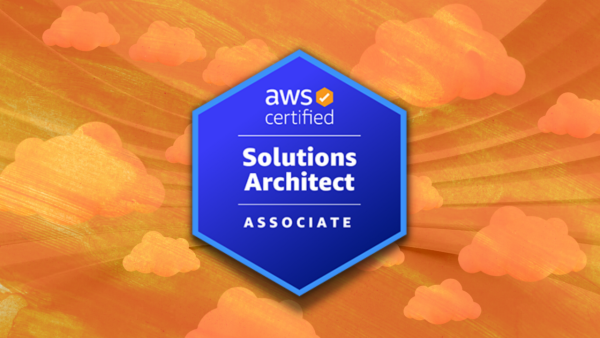Are you thinking of starting a career in tech but not sure which path to take?
Or maybe you’re already working in tech but are thinking of changing roles and are looking for the latest hot careers?
Well, good news!
You can either:
Take our tech career path quiz and find the best tech role for you, and get a personalized step-by-step roadmap to learn the skills and land the job, or
Keep reading and learn about the most in-demand tech jobs for 2025 that I think will give you a great career over the next 10 years and beyond
Come on… Just tell me the list!
You don’t mess around, do you?
Alright then, here's a quick summary of my picks for the top in-demand tech jobs of 2025:
Software Developer is one of the easiest entry-level roles to get into, it gives you a great foundation to move into other areas, and you can earn a good salary. The haters will say AI is replacing developers but I've yet to see evidence of this. There's still plenty of demand for developers
Cyber Security is the highest demand role right now on our list purely by # of jobs available and it’s pretty cool to get paid to hack systems!
Data Roles can pay very well and is one of the most versatile roles since companies across all industries need people to help them understand their numbers
Machine Learning Engineer or AI Engineer is probably the hardest to land a job in but it offers a very high average salary, and the growth over the next few years is going to be insane… the sooner you get in the better
Cloud Engineering is probably the least interesting role on the list (subjective of course) but it currently pays the most and has the largest growth of any industry on this list. It’s not going away anytime soon so you could have a nice career in this space
Why keep reading?
Unlike all the other posts out there that just list off a bunch of jobs and nothing else, I'm going to tell you exactly WHY these are the best options and how to actually get hired in each role.
Plus, I'm also going to tell you my “Top Tech Job To Watch for in 2026” 👀!
How did I come up with these 6 roles? Why not 15 or 20?
The reason that I chose to only give you the top 6, is because your time is valuable. No one has the time to read top 100 roles type articles.
That, and when you have too many options, it just gets overwhelming and you don't choose. You read some things, get confused, and don't move forward and make a decision.
So instead, I want to give you the best so you can pick one, take action, and get hired ASAP.
A quick note before the selection criteria
If you’re not sure exactly what you want to do, but know that you just want to land a job in tech as quickly as possible, check out my guide to entry level tech jobs
If you already have a strong curiosity in a field that I haven’t listed, pick that (ex: product design)
Why?
Because the best career for you is the one that you’re actually going to stick around long enough to learn the skills needed to land a job.
But if you're open to looking into some of the very best tech career options, then keep on reading.
Why listen to me?
I've been in the tech industry for many years now. First as a Software Developer, and then as an instructor teaching in-demand tech skills to over 1,000,000 students around the world.
I write two extremely popular monthly newsletters (read by 1,000s of tech professionals every month) so you know I'm constantly staying on top of the trends.
However, I didn't just pick these roles because they are trending. In fact, I used 5 key selection criteria.
The selection criteria for deciding the top tech career opportunities
It must be a highly in-demand skill that will allow you to get paid a high salary and pick which company you want to work for if you have the right skills
It must be growing faster than the number of skilled workers so that the job market doesn’t get saturated
It must be international and needed all around the world
It must be a skill that anyone can afford to learn without needing to spend $10,000 - $100,000 going to school or a bootcamp (screw that!)
It must be a skill that will be useful many years into the future
That last point is a tricky one because everyone thinks they have an idea of what the future will hold, but let’s be honest… that is rarely the case.
And so where possible, I’ve also looked at current and past growth, as well as labor or industry valuation projections for the next 5-10 years to give us a solid basis on these decisions.
I don’t always get it right, but I have a pretty high success rate, when using this criteria.
So let's dive into these options for 2025.
Software Developer

Average salary: $111,845
Current # of job postings in the US: 403,074 open Software Developers right now on ZipRecruiter
Industry size and expected growth: Predicted to grow to $858.1 Billion by 2028. The US Bureau of labor statistics predicts a 25% growth in jobs, rising to around 2,246,500 total software development jobs by 2032
So as you can see, software development is a massive industry and it’s a safe bet that this industry won’t be going away anytime soon.
We are literally surrounded by software. Everything from websites, apps on your phone, your car, in your home, and more.
Pretty much every company in the world needs someone that has software development skills. And if they don't, they're probably not a business that will be around long.
Don’t believe me?
What if I told you that there are approximately 6.3 Billion smartphone owners across the world, and even more shockingly, 88% of the time that people use their phone, it's on an app!
Not only that, but 49% of people open an app 11 or more times each day, while over 20% of Millennials open an app more than 50+ times each day.
Software and app development is here to stay. Sure, robots and AI might take over one day, but that’s not happening anytime soon. And even when it does, someone still has to build and train the AI, right? (Which is why it's another role on this list).
Why become a Software Developer?
There are two other important reasons why Software Development is #1 on this list.
First, unlike in the past, where you had to know different programming languages to accomplish different tasks, you can now build anything on any platform with just the knowledge of one of the main foundational programming languages like JavaScript or Python.
Front-end, Back-end. It doesn't matter anymore. At this point, the only limit to what you can build with either of those languages is your imagination.
Second, knowing software development provides you with an incredible base and foundational technical knowledge. This allows you to easily pivot or expand your skills into so many different niches (blockchain, machine learning, AI) much more quickly.
You'll also be able to pick up any new technologies that will inevitably pop up in the coming years super quickly and not feel overwhelmed. This is true more than ever with new AI tools and LLMs coming out every month.
The demos of all these tools look amazing but you still need foundational knowledge to utilize them properly and take advantage of them in the real world.
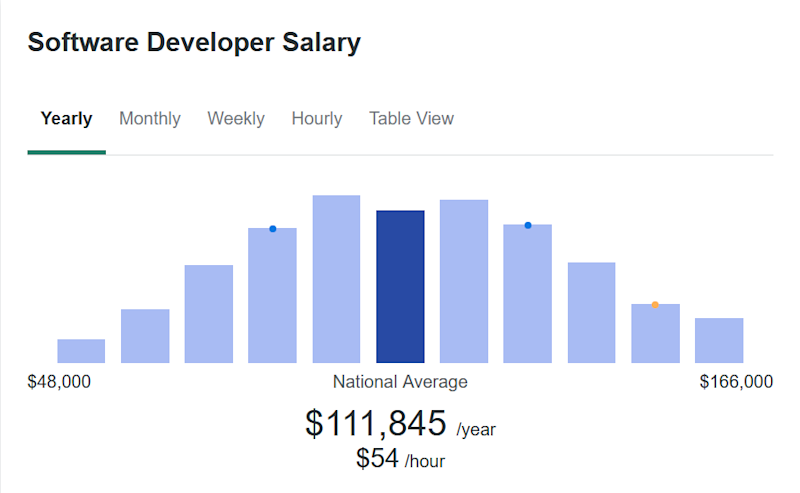
So as you can see, the software development and app space is huge, the tools are better than ever, you can get paid well, and it provides you with a great foundation to future-proof your career and branch off into other areas which we’ll talk about soon.
Not to mention, you have the opportunity to work on really cool projects and have the potential to have a huge impact. You can even find plenty of remote jobs too if that's your thing.
I could go on all day but just trust me. This is the #1 option to start your career in tech. It's also one the biggest growth sectors, with an additional 431,000 jobs predicted by 2032.
How do you get started as a Software Developer?
You can go from zero to hired by taking my full-stack web developer step-by-step career path.
It will walk you through all the steps required, as well as what to learn, and in what order so you can get hired as a software developer ASAP.
Sidenote: I also wrote a blog post version of this for more context if you want to see WHY I suggest what you learn and in that specific order, if you want to check that out.
Or, you can check out my course on becoming a full-stack web dev:
TL;DR: Software Development is my #1 pick for 2025.
You don’t have to just stay there though. The beauty of Software Development is that once you learn to code, it’s so easy to move into other fast-growing industries.
Such as…
Cyber Security Expert
Cyber Security is an incredibly interesting and in-demand industry.
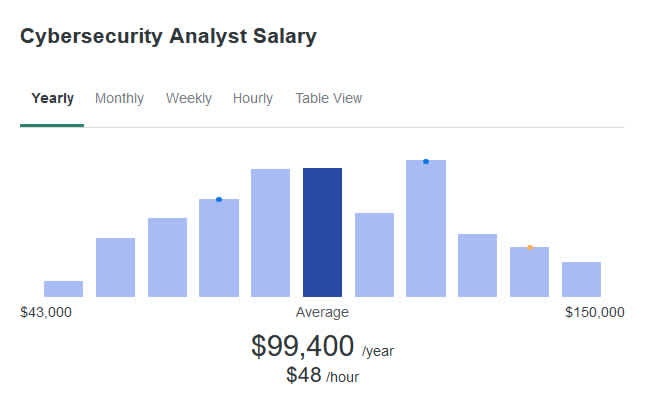
Average salary: There are a number of different roles in Cybersecurity, so the average salary can vary. Analysts get around $99,400, while Penetration testers get around $119,895 per year
Current # of job postings in the US: As of Feb 2025, there are currently 92,860 Cyber Security job openings in the United States on LinkedIn alone. Bear in mind also that this is just ONE job posting platform
Industry size and expected growth: The global cybersecurity market size is projected to grow to $451.22 Billion in 2030 with a predicted growth of new jobs becoming available of 32% by 2032
Hacking is big business costing individuals and companies billions of dollars a year. That's why companies are ramping up their Cyber Security budgets and hiring more than ever.
A really cool thing about Cyber Security is the unique range of roles that you can work in, with anything from:
Consulting and analyzing issues
To penetration testing or red teaming and being paid to attempt to hack into systems to find weaknesses or vulnerabilities
Or being a bug bounty hunter (finding bugs or errors in code for a one-time fee... these fees can be hundreds or even thousands of dollars)

How cool is that!?
Why become a Cyber Security Expert?
Cyber Security is another industry with high pay and job security (no pun intended).
The average salary for a Cyber Security Analyst is ~$99k per year, while penetration testers earn around $120k, but this can be even higher if they take on freelance and consulting gigs.
How do you get started in Cyber Security?
You can either check out content for free online, or you can get started from scratch with no prior coding experience, and take our complete Cyber Security Bootcamp.
Then if you want to niche down further and continue to skill up, you can learn:
As well as Penetration Testing and Bug Bounty hunting
Why continue to skill up?
Some bug bounties (i.e issues on a site or app that you are paid to find), can offer as high as $1.5 Million dollars each!

Not bad right?
Even on the low end, bug bounties can pay multiple thousands of dollars!
Data Wrangler
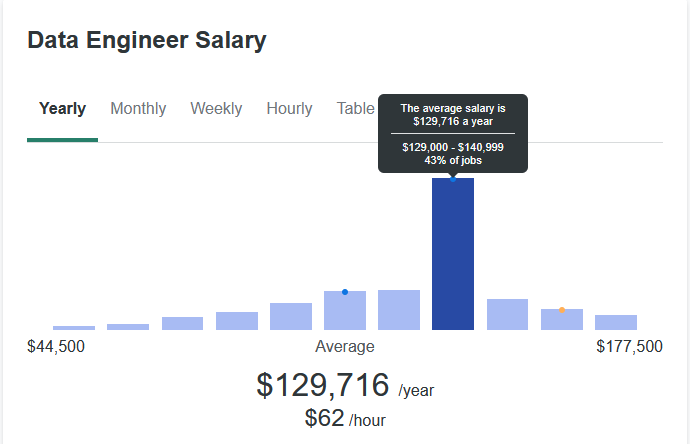
Average salary: There are numerous ‘Data Wrangler' roles available and salary differs between them, based on years of experience and complexity of the role. Data Analysts make around $82,640, [Data Scientists earn around $122,738 per year, and Data Engineers make on average $129,716
Current # of job postings in the US: There are currently 453,360 Data Science / Analysis / Engineering jobs available in the US right now!
Industry size and expected growth: Current estimates are that the global data science and analysis market will grow to $322.9 Billion by 2030, which is a 27.7% growth rate
Because the world of data jobs is growing and evolving so fast, different companies call these roles different things. That's why I'm using ‘Data Wrangler’ here as a catch all term for people who work with, clean, or advise on data.
The most common roles are: Data Engineers, Data Analysts, and Data Scientists. (Check out that guide to learn about the differences of each).
So why has data become so 'hot'?
The biggest difference between companies that fail, and the ones that become market leaders, is their ability to track, understand, and make decisions based on their data.
Simple as that. Data is the new currency.

It’s so important that every single MAANG company can be described as ‘data-driven’. This basically just means that pretty much every decision they make is based on data and not just Zuck's gut feeling of what he thinks is cool (Sometimes).
It's not just big tech companies though. It’s true for market leaders in almost any industry.
The thing is, for a while it was only the larger companies that saw the value and acted on this. But nowadays, almost every company that wants to succeed needs to be leveraging their data better.
Why become a Data Wrangler?
Each data role is slightly different but they are all a key part of either acquiring, cleaning, understanding, or making predictions and actions based on data.
That’s why this industry is also predicted to grow 27.7% by 2030!
Add in the fact that Data Analyst salaries average around $82k, Data Scientist salaries average $123k, and Data Engineers' average salary is a whopping $129k, it’s instantly clear that companies are willing to pay top dollar for people who have these skills. (Each of these is around a $4-6k increase in average salary since last year also).
As for job opportunities?
There are WAY more data related jobs available than there are people with these skills. It's a huge mismatch which means this is a great time to dive into this career.
In fact, there are over 450,000 data related jobs available as of writing right now in the United States alone!
How do you get started in the world of Data and Business Intelligence?
It depends on your current skills and experience. But you'll usually start out as a Data Analyst and can then move into a Data Engineer or Data Scientist role once you have more experience.
But that's not to say you can't get a role as a Data Engineer or Data Scientist right away, as long as you have the specific skills:
If you want to take a more technical route (ex: learning and using Python), then take this course to go from complete beginner to full-time Data Analyst
If you are already experienced with Excel, you can actually do much more than you'd think. Many Data and Business Intelligence Analyst's use it as their main tool. This course covers everything you need to launch a career as a data professional using Excel
From there, you can take your skills even further and learn:
Power BI ("Business Intelligence") - a key tool for data visualization
Time series forecasting to start training towards becoming a Data Scientist
Data Science Bootcamp - if you're finding time series forecasting interesting and useful, why not go all out and become a full time Data Scientist or Data Engineer? This bootcamp will get you there
Machine Learning or AI Engineer
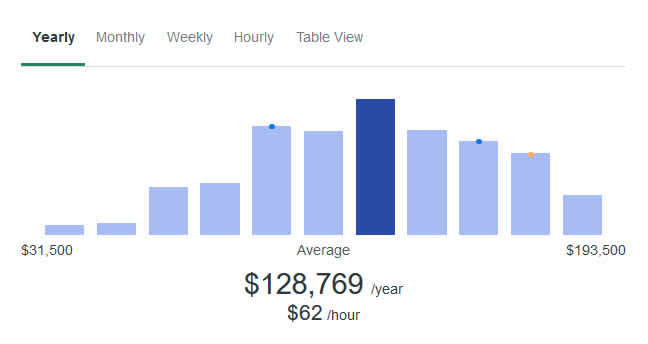
Average salary: Starting at around $129,000 for ML Engineers, and $102,000 for AI Engineers
Current # of job postings in the US: There are currently 65,997 AI Engineering jobs available in the US, and a further 103,706 Machine Learning jobs
Industry size and expected growth: The global AI + Machine Learning market size is expected to grow to $225.91 billion by 2030
AI and ML are exploding right now.
In fact, there’s so much growth that new jobs are being created to fit new roles, all due to new capabilities that are becoming available, such as an AI Engineer) or a Prompt Engineer.
(Last year, there was only 15,000 AI Engineering roles on this list, compared to the 65,997 available this year, while Prompt Engineering roles have jumped from 1,000 to nearly 10,000. Likewise, ML Engineering roles have nearly doubled!)
So yeah, there's huge growth in each of these roles, and projected industry growth of $225 Billion.
The reason I've included AI Engineering as an overlap with the ML Engineer role this year, is simply because of the overlap in skills and industry. Both have a direct impact on each others growth, so it makes sense to talk about them together.
Why become an AI or Machine Learning Engineer?
As of the time of writing, the current average salary for a Machine Learning Engineer is around $129k per year but we've even heard of senior ML people at big tech companies (ex: Tesla, Microsoft, etc.) making way more than that.
Both roles work with AI algorithms.
ML Engineers work behind the scenes to create and tweak algorithms so that machines can learn from data and make predictions — enabling tools like voice assistants, self-driving cars, robots, and LLMs to function.
Meanwhile, AI Engineers take those models and integrate them into real-world applications. Their work focuses on deploying AI systems, optimizing performance, and ensuring AI-driven solutions work at scale. Think chatbots that feel human-like, AI-powered recommendation engines, and smart automation in industries like healthcare and finance.
Both roles require a strong foundation in programming (Python, TensorFlow, PyTorch), math (linear algebra, statistics), and data processing. However, AI Engineers tend to focus more on system architecture, APIs, and AI deployment, while ML Engineers are more focused on refining and training models.
The only downside? It’s probably the hardest role to pick up as a complete beginner on this list because it’s deeply technical. But that doesn’t mean it’s impossible. With the right learning path, it’s totally achievable—even without a degree.
How to become an AI or Machine Learning Engineer?
Well, there are a few options.
You can either take our complete A.I. & Machine Learning and Data Science Bootcamp which will fast-track you into getting hired and learning how to become a Machine Learning Engineer, even if you’ve never coded before in your life.
Or you can check out these guides:
Both will walk you through what you need to learn and in what order, as well as share resources to get started.
Cloud Engineer
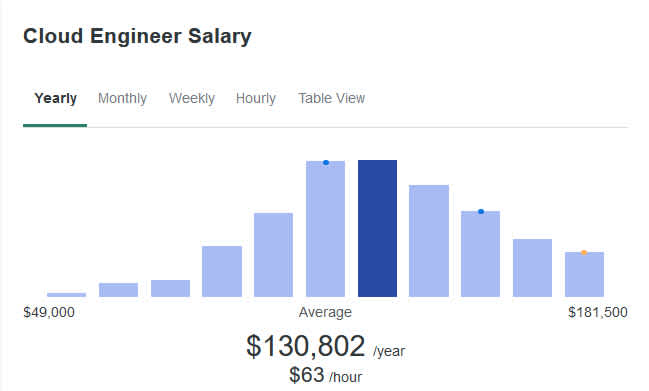
Average salary: Around $131,000
Current # of job postings in the US: There are 128,928 Cloud Engineering jobs currently available on ZipRecruiter
Industry size and expected growth: This will blow your mind. The global cloud computing market is expected to to reach $1,554.94 Trillion by 2030
Cloud computing and engineering might not be as exciting or sexy as the other areas on this list, but it is an essential infrastructure of the internet at this point.
It seems like it's already absolutely everywhere and somehow just keeps getting bigger and bigger. AWS, Google Cloud, Azure... each of these business units could be massive independent companies on their own.
Look at this graph of Amazon's AWS revenue over time. It's absolutely bonkers.
Why become a Cloud Engineer?
Companies need people to manage their cloud services, to help them pick the right ones, to maintain them, to keep the costs down as much as possible, etc.
It's a key role, and a fundamental technology that's here to stay, shaping the way that businesses operate and innovate. Heck, you only have to look at the projected growth to see just how important this is.
Also, like every role on this list, it’s well paid and in extremely high demand. $131,000 is nothing to be sniffed at, and those 129,000 available jobs will only continue to grow as this industry expands out. (In fact, the number of roles last year was 63,000 so this has doubled in 12 months!)
In terms of the actual work you’ll do as a Cloud Engineer, you play a crucial role in designing, implementing, and maintaining cloud-based systems, enabling organizations to leverage cutting-edge technologies and optimize their operations.
How do you become a Cloud Engineer?
Our resident Cloud expert Amber Israelsen actually wrote a step by step guide to becoming a Cloud Engineer here, but let me give you the mile high overview.
You don’t need a degree to get hired, but you do need to learn the basic Cloud fundamentals, so learn those first. Start off by learning how to become a certified Cloud Practitioner, and pass the AWS practitioner exam. You can even start working with the cloud at this point, but don’t stop learning here
Now that you have the fundamentals, continue to learn to become a Cloud Engineer, and learn advanced cloud technologies and methods. This will not only open up more Senior roles for you, but it can also pay a LOT more
Learn a programming language. You’re going to need some basic, foundational knowledge in a programming language, simply because this will come up now and again during your work. Amber recommends either learning Python or JavaScript, and working through a course on either of these until you feel comfortable and understand the core principles, and can write some code
Get some hands-on experience and apply what you’ve been learning by building some portfolio projects. A great idea is to actually pull together several different pieces, demonstrating that you can put together a solid cloud infrastructure. If you're not sure where to start, use this project as a guide to building a simple web app which uses a lot of common AWS elements
Prepare for the interview, and learn the answers to these questions
Apply for jobs!
Want a step by step process with everything to learn, in the right order so you can just follow until you're ready to be hired?
Check out our Cloud Engineer career path roadmap!
Become a AWS Cloud Engineer
11 milestones 9 courses
Step-by-step roadmap where you'll learn to code and build a portfolio.
Curated curriculum of courses, workshops, challenges, projects, and action items.
Become a AWS Cloud Engineer from scratch and actually get hired.
Earn on average per year:
$154,788
US salary data collected from Indeed, LinkedIn, and Web3.career 2026.
Common Questions
If you’re crunched for time and just want the answers, here they are.
Which is the most in demand tech job?
It depends on how you look at it. Right now, data roles have the highest total demand, with over 450,000 open positions across Data Analysts, Data Engineers, and Data Scientists.
But if we’re looking at a single job title, Software Developer takes the top spot, with over 400,000 open positions in the U.S. alone.
Cybersecurity is growing the fastest, with a projected 32% growth rate by 2032, as businesses rush to protect themselves from increasing cyber threats.
So, if you’re looking for the most open jobs today, data is the clear winner. But if you want a specific, high-demand role, Software Development is still at the top.
Which is the highest paying tech job?
That depends on experience. Senior roles in AI, Cybersecurity, and Cloud can easily hit mid-six figures, but those take years to reach.
For the highest average salary among in-demand roles, Cloud Engineers lead the pack at $131,000 per year.
Other strong earners include:
Machine Learning Engineer: $129,000 per year
Data Engineer: $129,716 per year
Cybersecurity Penetration Tester: $119,895 per year
Software Developer: $111,845 per year
If you’re aiming for a high-paying career with strong demand, Cloud, AI, and Cybersecurity are great choices.
Which area of tech is best for the future?
All six roles covered in this post have strong long-term potential:
Software Developer is one of the easiest entry-level roles to get into, it gives you a great foundation to move into other areas, and you can earn a good salary
Data Roles can pay very well and is one of the most versatile roles since companies across all industries need people to help them understand their numbers
Cyber Security is the highest demand role right now on this list purely by # of jobs available and it’s pretty cool to get paid to hack systems!
Machine Learning or AI Engineer is probably the hardest to land a job in but it offers a very high average salary, and the growth over the next few years is going to be insane… get in now
Cloud Engineering is probably the least interesting role on the list (subjective of course) but it currently pays the most and has the largest growth of any industry on this list. It’s not going away anytime soon, so you could have a nice career in this space
What are the most exciting tech jobs that have the best chance of making it onto the list in 2026?
Definitely AI Engineering and Prompt Engineering.
AI Engineering is already a major career path, with nearly 66,000 open roles and growing demand across industries
Prompt Engineering is newer, but job listings have jumped from 1,000 to nearly 10,000 in a year, showing massive early adoption
If you want to plan ahead and think these roles could be interesting, I highly recommend focusing on Software Development or Machine Learning for 2025 first.
Either of these will give you a very strong foundation to pivot into niche AI roles the fastest once more and more companies start introducing AI specific roles in the coming years.
What is the easiest and highest-paying tech job?
Hmm, that depends on what you enjoy and find easy!
But if you forced me to choose, I’d have to say that Web/Software Development is probably the easiest to get into and you can definitely be making $100K - $300K within a few years of being in the industry if you work hard and play your cards right.
It’s also the best option if you think you might want to explore other tech roles and niches over time as well because you’ll have a fantastic foundation.
Which role will you choose?
They’re all good options. The best time to get into tech was last year (that’s a lie… maybe 2019 or 2021) but the next best time is right now.
Pick a path and go for it. No matter your background, your age, or any other reason!
If you’re not sure which one is best for you, then why not take our tech career quiz?
It’ll ask you a few questions and then not only suggest the best role but also give you a step-by-step guide to making it happen.
P.S.
Come join Zero To Mastery to go from complete beginner to landing your first job in tech to advancing your career to places you never thought possible.
1,000s of others have and you can too.
You will get access to all of our career paths, courses, workshops and more with your membership. And we have a 30 day money back guarantee so you have nothing to lose by giving it a shot.
Take your first step to getting that dream tech career!
Best articles. Best resources. Only for ZTM subscribers.
If you enjoyed this post and want to get more like it in the future, subscribe below. By joining the ZTM community of over 100,000 developers you’ll receive Web Developer Monthly (the fastest growing monthly newsletter for developers) and other exclusive ZTM posts, opportunities and offers.
No spam ever, unsubscribe anytime





